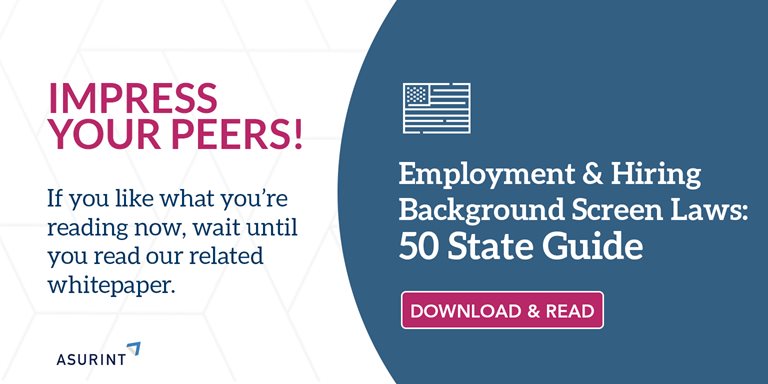At this point in the year, the majority of state legislatures have adjourned their legislative session. As is typical, the end of the session led to a flurry of legislative activity with several actions impacting employers as it relates to background screening.
Maryland Governor Vetoes Ban the Box
We previously reported that Maryland enacted a ban the box law that, while straightforward in terms of regulating the timing of the criminal history question, did not preempt any local legislation. Governor Larry Hogan vetoed the ban the box bill stating in his veto letter that “[e]mployers have the right, and often the need, to know the criminal history of applicants they may hire.” Governor Hogan also cited the “dangerous preemption language” that would allow for a continued patchwork of laws across the state.Maryland’s state legislature does not reconvene until January 2020 at which point they may seek to override the Governor’s veto.

Salary History
Salary history continues to be a hot topic as well with more states and cities joining the growing trend.Colorado
Through passage of SB85, Colorado amended its pay equity law. As part of the amendments, SB95 prohibits employers from seeking or relying on the wage rate history of a job applicant. Further, employers may not discriminate or retaliate against a job candidate for failing to disclose such information, or against an employee who seeks to invoke the law or assist with its enforcement.The amendments also include language prohibiting employers from taking action against employees who discuss wage rates. Employers may also not require employees to sign a waiver that prohibits them from disclosing wage rate information or deny the employee the right to disclose wage rate information. The law takes effect January 1, 2021.
Kansas City, Missouri
Kansas City also joined the salary history party by passing Ordinance No. 190380. The law, which goes into effect October 31, 2019, prohibits employers (those with 6 employees or more) from:- Inquiring into the salary history of a job applicant.
- Screening job applicants based on current or prior wages, benefits or other compensation, or requiring that information satisfy a minimum or maximum criteria.
- Relying on the applicant’s salary history when deciding whether to offer employment, or when determining the salary, benefits or other compensation to offer.
- Refusing to hire or otherwise disfavoring, injuring or retaliating against an applicant for not disclosing their salary history.
